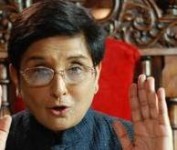‘Not a drop of contrived reality’

"There is no more powerful medium for social change than media." Thus spake Kiran Bedi, once
Bedi’s point is that alternative dispute resolution is the future in a country whose law courts are clogged with cases.The show sees parties involved in domestic disputes come forth and put their points across to Bedi who encourages a discussion to reach a conclusion. As those who watch the show know, she also does a lot of haranguing. In its first season as an alternate dispute redressal forum, the show saw 52 cases being resolved.
And what happens afterwards? Does the solution stick or break up? On Saturday March 14, the final episode of the first series of Aap ki Kacheri will follow some of the cases which were resolved and show us what happened thereafter.
"The Indian Penal Code forms the main backbone of the show. We have a strong legal team and before calling in the participants on the show, we discuss the legalities involved so that proper advice can be given," Bedi said. "However, there are a few (conditions) before letting someone participate in the show. The first being that both the parties should be willing to participate voluntarily, it should not be a criminal case and the case should not be with any court," she said.
Common family disputes like those between mothers-in-law and daughters-in-law, and husband and wife on issues such as not allowing the woman to work, have generated a lot of interest in the show. Bedi said she enjoyed doing it because it let her put into use all her 35 years of experience as a police officer and an NGO worker in the show. "The concept sets a good precedent to have community courts to solve disputes amicably between the parties without going to higher courts," she said.
At a Star Plus event to mark the end of the first series and announce the next season of the show, Bedi said the time had come for nformal courts for communities like Residents Welfare Associations (RWA) to resolve small issues amicably without being dragged to higher courts. RWAs should set up their own Lok Adalats (people¿s courts), she felt.
"Whether it¿s a fight over parking space or losing your pet dog, you run to the police for every small thing. The police is already so overburdened with terrorism and crime cases, such cases simply add to their burden," she said.
"To solve such cases promptly and amicably between parties without dragging them to higher courts, I think colleges and even schools should start having their own Lok Adalats to solve problems," said Bedi. "Lets go from Aap Ki Kacheri to Apni Kacheri." Bedi said care should be taken that the panel in such informal courts should consist of "an elderly citizen, a woman and a youth to give a balanced judgement". "Also the panel should change at regular intervals to ensure no partiality of justice," she suggested.
About the second season of the TV show, Bedi said: "Aap Ki Kacheri will now create apni adalats in different cities, towns and villages so that more cases are resolved. And more important than that, more people are made aware of the laws and empowered." Siddharth Basu, the show’s producer said that from being Delhi-based in its dispute redressal, it will now become a pan Indian show.
Star Plus gambled on this show, he said, replacing Kyonki Saas Bhi Kabhi Bahu thi with this. And it worked. To say it is the highest rate non fiction show means this series is more
successful than all the other reality shows that were on air with it, whether it was Big Boss or the dance or music reality shows.
Actor Rahul Basu said at the panel discussion held at the event that Indian TV entertainment channels have consistently underestimated the emotional intelligence of the audience. "The time had come five years ago but it takes a channel a long time to get over its fears that it won’t get ratings," he said.
The show has two sharp women lawyers working with Bedi on it, they do a thorough trial run of the problem each show will tackle, but once the parties come into the kacheri to record the programme it is spontaneous and unrehearsed all the way, Basu said. "There is not a drop of contrived reality in it."
Bedi’s belief is that watching her show gives people ideas on how they can solve their own disputes and tricky problems without resorting to court action. There’s media activism for you.






